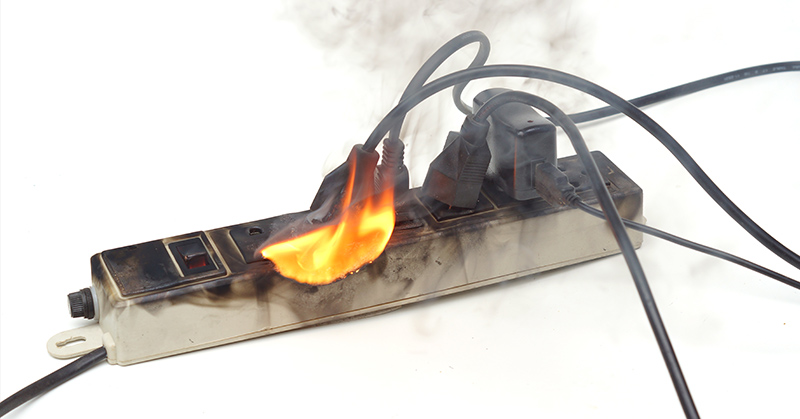As most of the northern hemisphere moves into its coldest months of the year, heating systems are being turned on and in many cases, space heaters are being pulled out of storage. According to firefighters, these are some items that you should never plug into a power strip.
Space Heaters: The Item You Should Never Plug Into a Power Strip
Space heaters are commonly used around the world when the weather gets cold. After all, we all just want to be cozy and warm when icy winds are blowing outside. In light of the upcoming space heater season, Oregon firefighters put out a very important post regarding their safety. (1) Their number one tip? Never plug your space heater into a power strip. (1)
“You should never plug a heater into a power strip,” Umatilla County Fire District #1 in Hermiston, Oregon, warned on Facebook. “These units are not designed to handle the high current flow needed for a space heater and can overheat or even catch fire due to the added energy flow.” (1) As it turns out, thousands of people are unaware of how dangerous it is to plug a space heater into a power cord and the post quickly went viral. (1)
Read More: Man Shows How He Uses a Old Washing Machine to Generate Free Electricity
A Fire Starter: Plugging Into a Powerstrip

The Oregon fire department isn’t the only one sharing space heater safety tips. The Toledo Fire Department in Ohio also issued a similar statement after a house caught fire due to the misuse of a space heater. The heater caused the couch to catch fire and quickly the entire house was up in flames. (2)
Space heaters can reach up to 600 degrees Fahrenheit, so it is crucial that everyone who uses them does so safely. (2) Their tips include (2):
- Never plug into a power strip, instead always directly into a wall unit
- Keep a minimum of three feet of space around the space heater at all times
- Always keep an eye on your space heater while it is in use, never turn it on while sleeping or in a different room
- Place heaters on level, flat surfaces
- Never put heaters on cabinets, tables, furniture, or carpet
The Consumer Product Safety Commission reports that portable electric space heaters cause 1,200 fires a year. (3) The Oregon firefighters’ post explained that if people are smart and safe, there is nothing wrong with using a space heater. It’s recklessness that becomes an issue. (2) “The point comes down to proper use. Even the best equipment can fail if not used correctly. No one manufacturer is at fault, yet it’s all about the end user’s ability to use the product safely.” (2)
How to Prevent Electrical Fires at Home

Even in the cold winter months, electrical fires are preventable. These are our top tips to be fire-safe this winter and all year round:
1. Keep all heat-producing appliances unplugged when not in use.

This includes:
- Hairstyling tools
- Kettles
- Heaters
Essentially, anything that produces heat when turned on can overheat and catch fire if left on too long or can turn on in the event of a malfunction or electrical surge. (4)
2. Extension Cords for temporary use only.
Do not use extension cords 24/7, they are meant only for temporary use. Contact an electrician to install additional outlets if you require them. (4)
3. Keep the third prong.

The third prong on a power cord is there to protect against power surges and malfunctions. Consider updating two-pronged outlets in your home. (4)
4. Update your electrical system.

If you live in an old home, chances are that the home has an old electrical system. Contact an electrician to have it evaluated and consider upgrading. Older, less advanced systems are more likely to overheat and cause fires. (4)
Read More: Scientists Invent Device to Generate Electricity from Rain
5. Don’t use damaged power cords.
If the power cord is damaged in any way – frayed, a broken prong, loose from its plug, or cracked, don’t use it. (4)
6. Follow appliance directions.
Directions aren’t just there for optimal product use, they are there to keep you safe. Appliances always come with a manual that will include a section on fire safety as well as information on where to be notified of recalls. (4)

